French Open, Paris
May 23, 1988; 128 Draw (16 seeds) – $1,645,000; Surface – Clay
Ivan Lendl, a double defending champion, lost before semifinals for the first time in ten majors. Mats Wilander took advantage of it and captured his third French Open title, displaying superb form (97% of 1st serves in!) in the final against a crowd-favorite Henri Leconte, who survived three five-setters and hadn’t left in the tank after losing the first tight set. The Swede wasn’t a favorite to get the title at the start of the tournament despite winning Australian Open and Key Biscayne that year – he’d poorly played in two events prior to Roland Garros (Monte Carlo, Rome). And he was almost eliminated in the third round as he faced a non-clay specialist “Bobo” Zivojinovic, in a tricky rain-interrupted match, which the Swede began with a comfortable 6-2 3:0 lead, only to found himself at 2:5 in the deciding set! Lanky and short Michael Chang, who sensationally won in 1989, a year before made his debut outside the United States obtaining two easy wins at the age of 16. Two years older Andre Agassi notched his first successful Grand Slam event reaching the semifinals.
All scorelines
First round: (Times Wire Services)
Ivan Lendl, top-seeded among the men, won his opening match Tuesday in the French Open, but other seeded player was knocked out. Lendl, who has won this tournament the last two years, defeated Philippe Pech of France, 6-0, 6-3, 6-4. The men’s 10th-seeded player, Anders Jarryd, was trounced, 6-4, 7-5, 6-1, by fellow Swede Joakim Nystrom. Nystrom eliminated in Paris a seeded player also a year before in the first round. Other men’s winners on the second day of the Grand Slam tournament included second-seeded Stefan Edberg of Sweden over Karel Novacek of Czechoslovakia, 4-6, 6-3, 6-2, 6-2; Henri Leconte of France over Simon Youl of Australia, 6-3, 4-6, 6-7(3), 6-4, 6-3; Tim Mayotte over Carl Limberger of Australia, 6-1, 6-1, 6-4, and fourth-seeded Pat Cash of Australia over Jimmy Brown, 6-3, 6-1, 6-1. Boris Becker of West Germany defeated Claudio Mezzadri of Switzerland, 6-4, 6-2, 7-5, but had trouble making his serve-and-volley game work on the soft clay. Meanwhile, Slobodan Zivojinovic of Yugoslavia beat Aaron Krickstein, 6-4, 7-5, 2-6, 6-4, and 16-year-old “wild card” Michael Chang [122, first time playing outside the United States] defeated doubles specialist Robert Seguso, 7-5, 6-2, 6-3. The victories were the first at the French Open for Wimbledon champion Cash and the eighth-seeded Mayotte after being first-round losers in their three previous appearances. After losing in the first round here in 1982, 1983 and 1984, Mayotte simply skipped this tournament the next three years. “I was a little bit nervous today,” he said, adding with a laugh: “It’s one of the great milestones of my career.” Mayotte’s victory means all three seeded U.S. men survived their first-round matches. Lendl needs this year’s 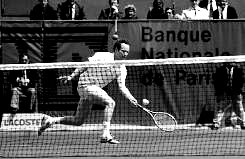 title to become the first player since Bjorn Borg to win the French Open three straight years. With 17 weeks to go, he also is homing in on Jimmy Connors‘ (he withdrew form Roland Garros ’88) record of 159 weeks atop the men’s rankings. Lendl said he is aiming to reach both goals. “When I see a challenge, I like to do something. I don’t like to give up,” he said. The oldest men’s player, 35-year-old Guillermo Vilas [78] of Argentina, also won. He eliminated Leonardo Lavalle of Mexico, 6-2, 6-3, 6-2. Lavalle [203] was 9 years old when Vilas won the French Open in 1977. John McEnroe became angry Monday and won his first match in the French Open tennis championships since 1985. For the second year in a row, McEnroe appeared headed for an early exit at Roland Garros, where he was upset in the first round last year by Horacio de la Pena. But this time, he reached the second round with a 7-6(2), 6-1, 7-6(2) victory over 21-year-old Alexandr Volkov of the Soviet Union. McEnroe, however, showed his anger as early as the 5th game of the 1st set. Volkov was leading, 3:1*, and moved to deuce when McEnroe hit a forehand into the net. “Choke. You’re a choker,” McEnroe screamed at himself. On the next point, his anger switched to an overzealous linesman, who called a foot fault before McEnroe even attempted his serve. McEnroe stopped and shouted: “Thanks for calling it before I hit it.” The ruling was overturned, and McEnroe slammed an ace to start his comeback. “You woke me up,” McEnroe said to the official as he rallied to win the set in a tiebreaker. In the 3rd set, he also won that tiebreaker by a 7/2 score. But McEnroe was clearly unhappy with the way he played in the first set. “It would have been tough to get worse,” he said. “I would have been defaulted by the chair umpire for bad play.” Another American who has already found a spot in French hearts is 18-year-old Andre Agassi [11]. He has scooted up the men’s ladder in the past six months with a two-fisted backhand and a showman’s feel for the crowd. Today he beat Italy’s top player, Paolo Cane, 6-4, 6-1, 6-2 for his 16th victory in 17 matches on clay in 1988. He is being cast as the good American as opposed to the ”bad boys,” McEnroe and Connors. Agassi also found cheering crowds at the Rome Open recently. ”I was surprised by the publicity in Rome,” he said. ”A lot of people
title to become the first player since Bjorn Borg to win the French Open three straight years. With 17 weeks to go, he also is homing in on Jimmy Connors‘ (he withdrew form Roland Garros ’88) record of 159 weeks atop the men’s rankings. Lendl said he is aiming to reach both goals. “When I see a challenge, I like to do something. I don’t like to give up,” he said. The oldest men’s player, 35-year-old Guillermo Vilas [78] of Argentina, also won. He eliminated Leonardo Lavalle of Mexico, 6-2, 6-3, 6-2. Lavalle [203] was 9 years old when Vilas won the French Open in 1977. John McEnroe became angry Monday and won his first match in the French Open tennis championships since 1985. For the second year in a row, McEnroe appeared headed for an early exit at Roland Garros, where he was upset in the first round last year by Horacio de la Pena. But this time, he reached the second round with a 7-6(2), 6-1, 7-6(2) victory over 21-year-old Alexandr Volkov of the Soviet Union. McEnroe, however, showed his anger as early as the 5th game of the 1st set. Volkov was leading, 3:1*, and moved to deuce when McEnroe hit a forehand into the net. “Choke. You’re a choker,” McEnroe screamed at himself. On the next point, his anger switched to an overzealous linesman, who called a foot fault before McEnroe even attempted his serve. McEnroe stopped and shouted: “Thanks for calling it before I hit it.” The ruling was overturned, and McEnroe slammed an ace to start his comeback. “You woke me up,” McEnroe said to the official as he rallied to win the set in a tiebreaker. In the 3rd set, he also won that tiebreaker by a 7/2 score. But McEnroe was clearly unhappy with the way he played in the first set. “It would have been tough to get worse,” he said. “I would have been defaulted by the chair umpire for bad play.” Another American who has already found a spot in French hearts is 18-year-old Andre Agassi [11]. He has scooted up the men’s ladder in the past six months with a two-fisted backhand and a showman’s feel for the crowd. Today he beat Italy’s top player, Paolo Cane, 6-4, 6-1, 6-2 for his 16th victory in 17 matches on clay in 1988. He is being cast as the good American as opposed to the ”bad boys,” McEnroe and Connors. Agassi also found cheering crowds at the Rome Open recently. ”I was surprised by the publicity in Rome,” he said. ”A lot of people 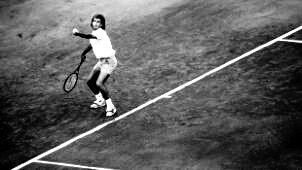 knew about me and had followed my game. Here it is the same: I am surprised, but I like it. It’s exciting.” Of McEnroe and Connors he said: ”I have always respected and admired them both, but I realized that I didn’t want to be the way they are on court.” Third-seeded Mats Wilander of Sweden beat Josef Cihak of Czechoslovakia, 7-5, 7-5, 6-1, and sixth-seeded Yannick Noah of France downed Ricki Osterthun of West Germany, 7-6(4), 6-1, 6-4. Mikael Pernfors of Sweden, the 1986 finalist, failed to make it past the first round for the second consecutive year, losing to Luiz Mattar of Brazil, 6-4, 6-2, 6-1. Andres Gomez defeated Ulf Stenlund 7-6(3), 6-0, 4-6, 4-6, 6-4 – the Ecuadorian beat the Swede after very similar scoreline in Paris in 1986, the in the fourth round: 7-5, 7-6(4), 4-6, 3-6, 6-4. 15th seeded, Guillermo Perez-Roldan won a prestigious duel of two talented teenage Argentinians, eliminating [64] Alberto Mancini 6-3, 7-5, 2-6, 6-4.
knew about me and had followed my game. Here it is the same: I am surprised, but I like it. It’s exciting.” Of McEnroe and Connors he said: ”I have always respected and admired them both, but I realized that I didn’t want to be the way they are on court.” Third-seeded Mats Wilander of Sweden beat Josef Cihak of Czechoslovakia, 7-5, 7-5, 6-1, and sixth-seeded Yannick Noah of France downed Ricki Osterthun of West Germany, 7-6(4), 6-1, 6-4. Mikael Pernfors of Sweden, the 1986 finalist, failed to make it past the first round for the second consecutive year, losing to Luiz Mattar of Brazil, 6-4, 6-2, 6-1. Andres Gomez defeated Ulf Stenlund 7-6(3), 6-0, 4-6, 4-6, 6-4 – the Ecuadorian beat the Swede after very similar scoreline in Paris in 1986, the in the fourth round: 7-5, 7-6(4), 4-6, 3-6, 6-4. 15th seeded, Guillermo Perez-Roldan won a prestigious duel of two talented teenage Argentinians, eliminating [64] Alberto Mancini 6-3, 7-5, 2-6, 6-4.
Second round: Robin Herman
The slow clay courts of Roland Garros Stadium, sticky with rain, dragged down the usually fleet of foot today, producing several close matches for highly seeded players at the French Open tennis tournament. It was rough going for fourth-seeded Pat Cash and 11th-seeded Henri Leconte. Both needed five sets to win their matches, Leconte for the second time in three days. An improved John McEnroe defeated a Swede, Christian Bergstrom, 6-2, 6-4, 6-3, with a repertory of slices, drop shots and passing shots backed by a strong serve. He still had too many hollow-sounding missed hits, though, to feel exultant. His opponent in the next round is the 16-year-old Californian Michael Chang, who at 131 pounds (59 kg! when he finished his career 15 years later was 14 kg heavier) is the smallest and youngest man in the draw. “I didn’t play that well today but he played very well,” Bergstrom said. ”He didn’t give me much chance at it. He was very good today. I had big problems with his serve. I didn’t even get close to breaking him.” Chang, from Placentia, beat Tobias Svantessen of Sweden, 6-4, 6-1, 6-3. He said he was looking forward to meeting McEnroe and hoping to fulfill his dreams. “I’d see McEnroe playing in, say, Wimbledon or the French and in my mind I’d think that I was out there playing for the finals of a Grand Slam, and I’d do really good,” he said. Despite differences in their ages and the directions of their careers, he said, the match means much the same to both of them. “It’s going to be a match to see where both of us are,” Chang said. ”John is gradually making his comeback, and I’m gradually making my way up.” Should McEnroe get past Chang, he is bound to meet top-seeded Ivan Lendl, who quickly disposed of Niclas Kroon of Sweden, 6-4, 6-0, 6-1. “Everybody thinks that opening rounds are formalities and a walk- through,” Lendl said. “It is a 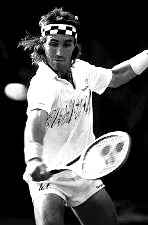 walk-through, but it’s a minefield out there.” Both Pat Cash and Henri Leconte had long matches that ended in rain. Cash, an Australian, defeated Javier Sanchez of Spain, 20 years old, 6-3, 3-6, 4-6, 6-2, 6-3. Cash played awkwardly on the rust-colored clay, booming the ball as though he were on a hard surface. Sanchez, a clay-court specialist, had a better feel for when to use a soft touch and when to push the ball hard. But Cash’s power game is difficult to deny on any surface, and with fewer errors in the last two sets, he was able to control the match. ”I feel you just let your racquet do the talking,” said Cash, who does not mince words. ”I know I can play well on clay. I’m not particularly worried about proving anything.” Leconte, a Frenchman, defeated Bruno Oresar of Yugoslavia, a qualifier ranked 100th, after 3 hours 20 minutes. The scores were 6-1, 6-0, 6-7(5), 1-6, 6-2. Leconte had been within 2 points of taking the match in the tie breaker of the 3rd set. But Oresar, a lithe figure on the clay court with long blond hair held back in a ponytail, possesses a sharp backhand passing shot that continually caught the chunky Leconte flat-footed. Oresar used that shot to take the final 2 points of the tie breaker. After Leconte saw that set slip away, he seemed in the clouds for the 4th set, losing it quickly. Later, he said it was intentional. ‘‘I decided not to play hard in the fourth, to have enough energy for the fifth,” he said. ”I preferred not to force it. I tried to tire him as much as I could.” The crowd had been pulling as much for Oresar as for Leconte, with cries of ”Allez, Bruno!” echoing in response to cries of ”Allez, Henri!” Leconte has a tentative relationship with the French public, which has tired of his inexplicable lapses and post-loss complaints. They sometimes call him Riton, a too-familiar diminutive of Henri. A new tennis expression has turned up here: ritonnade, meaning a totally unimaginable error. Leconte rediscovered his edge, and the fickle crowd’s support, in the 5th set. He cut his backhands as low and fine as could be, leaving his opponent exasperated. Tim Mayotte, after winning his first French Open match ever on Tuesday, lost to Magnus Gustafsson of Sweden, 7-6, 6-4, 6-4. Andres Gomez, a quarter-finalist three of the last four years here, was eliminated by Ronald Agenor of Haiti, 6-4, 4-6, 6-4, 7-6(4). “A streak of one,” Mayotte said of his first-round victory. Mayotte, a very respectable tennis figure of the 80s, finished his career with a poor clay-court record: 8-19. Seeded Swedes, second Stefan Edberg, third Mats Wilander and seventh Kent Carlsson won with an extreme ease dropping respectively 7, 6 & 5 games: Edberg beat Arnaud Boetsch [465] of France, 6-0, 6-4, 6-3, and Wilander, a two-time winner here, beat Francisco Yunis of Argentina, 6-2, 6-3, 6-1 and Carlsson breezed past his second-round opponent, Jerome Potier of France 6-3, 6-1, 6-1. Yannick Noah, the 1983 champion, defeated Luiz Mattar of Brazil, 6-2, 6-4, 4-6, 7-6(4). Mattar, down 3:1 and facing elimination, fought back and won the 3rd set, then played Noah evenly through the 4th set. In the deciding tie-break, Noah slipped as he rushed the net but managed a weak return while sitting in the clay dust of Roland Garros Stadium. He jumped up in time to fend off Mattar’s next shot, then volleyed a forehand winner to reach match point. “He has something special,” Mattar said of the former French Open champion, “People like to see him play.” Andre Agassi, the 18-year-old from Las Vegas, moved into the third round with a 6-1, 6-2, 6-2 victory over Massimiliano Narducci of Italy.
walk-through, but it’s a minefield out there.” Both Pat Cash and Henri Leconte had long matches that ended in rain. Cash, an Australian, defeated Javier Sanchez of Spain, 20 years old, 6-3, 3-6, 4-6, 6-2, 6-3. Cash played awkwardly on the rust-colored clay, booming the ball as though he were on a hard surface. Sanchez, a clay-court specialist, had a better feel for when to use a soft touch and when to push the ball hard. But Cash’s power game is difficult to deny on any surface, and with fewer errors in the last two sets, he was able to control the match. ”I feel you just let your racquet do the talking,” said Cash, who does not mince words. ”I know I can play well on clay. I’m not particularly worried about proving anything.” Leconte, a Frenchman, defeated Bruno Oresar of Yugoslavia, a qualifier ranked 100th, after 3 hours 20 minutes. The scores were 6-1, 6-0, 6-7(5), 1-6, 6-2. Leconte had been within 2 points of taking the match in the tie breaker of the 3rd set. But Oresar, a lithe figure on the clay court with long blond hair held back in a ponytail, possesses a sharp backhand passing shot that continually caught the chunky Leconte flat-footed. Oresar used that shot to take the final 2 points of the tie breaker. After Leconte saw that set slip away, he seemed in the clouds for the 4th set, losing it quickly. Later, he said it was intentional. ‘‘I decided not to play hard in the fourth, to have enough energy for the fifth,” he said. ”I preferred not to force it. I tried to tire him as much as I could.” The crowd had been pulling as much for Oresar as for Leconte, with cries of ”Allez, Bruno!” echoing in response to cries of ”Allez, Henri!” Leconte has a tentative relationship with the French public, which has tired of his inexplicable lapses and post-loss complaints. They sometimes call him Riton, a too-familiar diminutive of Henri. A new tennis expression has turned up here: ritonnade, meaning a totally unimaginable error. Leconte rediscovered his edge, and the fickle crowd’s support, in the 5th set. He cut his backhands as low and fine as could be, leaving his opponent exasperated. Tim Mayotte, after winning his first French Open match ever on Tuesday, lost to Magnus Gustafsson of Sweden, 7-6, 6-4, 6-4. Andres Gomez, a quarter-finalist three of the last four years here, was eliminated by Ronald Agenor of Haiti, 6-4, 4-6, 6-4, 7-6(4). “A streak of one,” Mayotte said of his first-round victory. Mayotte, a very respectable tennis figure of the 80s, finished his career with a poor clay-court record: 8-19. Seeded Swedes, second Stefan Edberg, third Mats Wilander and seventh Kent Carlsson won with an extreme ease dropping respectively 7, 6 & 5 games: Edberg beat Arnaud Boetsch [465] of France, 6-0, 6-4, 6-3, and Wilander, a two-time winner here, beat Francisco Yunis of Argentina, 6-2, 6-3, 6-1 and Carlsson breezed past his second-round opponent, Jerome Potier of France 6-3, 6-1, 6-1. Yannick Noah, the 1983 champion, defeated Luiz Mattar of Brazil, 6-2, 6-4, 4-6, 7-6(4). Mattar, down 3:1 and facing elimination, fought back and won the 3rd set, then played Noah evenly through the 4th set. In the deciding tie-break, Noah slipped as he rushed the net but managed a weak return while sitting in the clay dust of Roland Garros Stadium. He jumped up in time to fend off Mattar’s next shot, then volleyed a forehand winner to reach match point. “He has something special,” Mattar said of the former French Open champion, “People like to see him play.” Andre Agassi, the 18-year-old from Las Vegas, moved into the third round with a 6-1, 6-2, 6-2 victory over Massimiliano Narducci of Italy.  It’s as far as Agassi ever has gone in a Grand Slam tournament and left him wondering about his next opponent, Andres Vysand of the Soviet Union. “I’ve never even heard his name,” Agassi said. Guillermo Vilas, the 35-year-old former champion from Argentina, was eliminated by seven years younger countryman Eduardo Bengoechea 6-3, 4-6, 7-5, 6-0. And for at least another year, the Champion of France will not be the French Open champion. Thierry Champion was eliminated by Jonas Svensson of Sweden 6-2, 3-6, 6-2, 6-3. West German Boris Becker, the No. 5 men’s seed, beat the future Australian Open champion, 20-year-old Petr Korda of Czechoslovakia 6-4, 6-3, 6-4, for whom it was a Grand Slam debut.
It’s as far as Agassi ever has gone in a Grand Slam tournament and left him wondering about his next opponent, Andres Vysand of the Soviet Union. “I’ve never even heard his name,” Agassi said. Guillermo Vilas, the 35-year-old former champion from Argentina, was eliminated by seven years younger countryman Eduardo Bengoechea 6-3, 4-6, 7-5, 6-0. And for at least another year, the Champion of France will not be the French Open champion. Thierry Champion was eliminated by Jonas Svensson of Sweden 6-2, 3-6, 6-2, 6-3. West German Boris Becker, the No. 5 men’s seed, beat the future Australian Open champion, 20-year-old Petr Korda of Czechoslovakia 6-4, 6-3, 6-4, for whom it was a Grand Slam debut.
Third round: (AP)
Americans John McEnroe and Michael Chang, at 29 and 16 the oldest and youngest men in the field of the last 32, met in a late match on Court No. 1. McEnroe scored an easy 6-0, 6-3, 6-2 victory over the teen-ager. “I haven’t been kicked that hard before,” said Chang, who dominated players his age – and older – in the amateur ranks before turning pro three months ago: “It’s a good experience for me to see what the No. 1 player in the world is like. I think John is capable of regaining that rank again, if he wants to.” McEnroe, the 16th seed, broke Chang 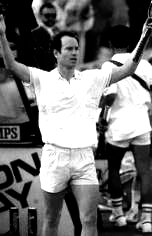 at love in the first game of the match and held at love in the second. Chang didn’t register his first point until he was behind 15/0 in the third game, breaking the streak on a running forehand down the line. He won just 10 points in the opening set, which McEnroe finished in 24 minutes when Chang netted a backhand. People peeking through portholes to watch the match and moving about in the stands proved more of a distraction for McEnroe than Chang did. McEnroe repeatedly asked for quiet from spectators, who were firmly in his corner. “It was different not having the crowd on my side,” Chang complained. “I never saw a crowd like that. They were loud. When we went out, I thought they were cheering for me. But when they announced John McEnroe – they went wild.” For McEnroe, it also was a different experience. The bad boy of tennis is accustomed to being booed. That’s why he was pleased about being supported by the French fans. “It’s like a home-court advantage to a certain degree,” McEnroe said. “I’ve played 10, 11 years on the circuit without having that. It’s nice to have it for a change.” Chang’s game improved in the 2nd set, when he got his first break point, but McEnroe got the only break he needed for a 4:3 lead. His serving was superb and he chased Chang ragged with volleys and forehands. In the 3rd set, McEnroe broke in the fourth and sixth games and held at love for the match. Third-seeded Mats Wilander of Sweden barely escaped elimination, coming back after trailing 5:2* in the 5th set to beat Slobodan Zivojinovic of Yugoslavia 6-2, 6-7(5), 3-6, 6-3, 7-5. Wilander, probably the mildest-mannered man in tennis, angrily hit a ball into the stands and stormed off court Friday as rain forced a postponement in the French Open. Wilander twice had asked the umpire to stop play when fading light made it difficult to see the lightning-fast serves of Zivojinovic. With winds beginning to gust and storm clouds gathering, Wilander played superbly to take the first set and go ahead by a break (3:0) in the second. Then heavy rain started to fall, and Wilander was unable to hold service. Play was then abandoned for the night. As Wilander, the 1982 and 1985 French champion, walked off court with a 6-2, 3:2* lead, he hit a ball angrily into the almost-empty stands, gathered his bag and, with lightning flashing, stomped off the course. On the following day the match turned into Zivojinovic’s favor, and he was serving for the match at 5:3 in the final set, but after a terrific volley at Wilander’s feet, Zivojinovic paused for a moment and Wilander picked up the ball and slapped it past him. Then the Yugoslav missed an overhead shot after Wilander flipped up a chip shot. Wilander won five straight games and celebrated his victory by slamming a ball out of the stadium (Zivojinovic wasn’t closer than three points to make a huge upset). Second seed Stefan Edberg scored straight-set victory that was tougher than usual yesterday at the French Open. After beating countryman Jan Gunnarsson 6-3, 6-4, 7-6(5), Edberg, a normally mild-mannered Swede, criticized tournament officials who made him play two of his first three matches on a bumpy outside court. ”I deserve better than that,” the world’s No. 2 tennis player said after finally clinching a spot in the fourth round on his sixth match point. Edberg, who has played two matches on Court No. 11, where more obscure players usually perform before a few hundred spectators. ”It is a really, really bad court. The bounces you get there are real bad,” he said. ”I have played one match on Court No. 1, but I would like to get at least one match on center court.” Edberg squandered four match points leading 5:4, another one at 6:5, then came back from a 2:5 deficit in the tie-break. Boris Becker, the fifth seed, won 6-1, 4-6, 7-5, 6-3 over Thomas Muster of Austria, a left-hander who had the West German in trouble by running down almost all of his powerful forehands. But when leading 3:1 in the 4th set, Muster chased a Becker shot and slammed into a metal advertising sign at courtside, hitting the elbow and forehand of his left arm. Muster returned to play, but did not win another game, as Becker reeled off five in a row to take the match. Ivan Lendl of Czechoslovakia, the No. 1 seed among the men, downed Thierry Tulasne of France 6-3, 7-6(4), 6-2. Lendl beat Tulasne also in the third round 12 months before losing just one
at love in the first game of the match and held at love in the second. Chang didn’t register his first point until he was behind 15/0 in the third game, breaking the streak on a running forehand down the line. He won just 10 points in the opening set, which McEnroe finished in 24 minutes when Chang netted a backhand. People peeking through portholes to watch the match and moving about in the stands proved more of a distraction for McEnroe than Chang did. McEnroe repeatedly asked for quiet from spectators, who were firmly in his corner. “It was different not having the crowd on my side,” Chang complained. “I never saw a crowd like that. They were loud. When we went out, I thought they were cheering for me. But when they announced John McEnroe – they went wild.” For McEnroe, it also was a different experience. The bad boy of tennis is accustomed to being booed. That’s why he was pleased about being supported by the French fans. “It’s like a home-court advantage to a certain degree,” McEnroe said. “I’ve played 10, 11 years on the circuit without having that. It’s nice to have it for a change.” Chang’s game improved in the 2nd set, when he got his first break point, but McEnroe got the only break he needed for a 4:3 lead. His serving was superb and he chased Chang ragged with volleys and forehands. In the 3rd set, McEnroe broke in the fourth and sixth games and held at love for the match. Third-seeded Mats Wilander of Sweden barely escaped elimination, coming back after trailing 5:2* in the 5th set to beat Slobodan Zivojinovic of Yugoslavia 6-2, 6-7(5), 3-6, 6-3, 7-5. Wilander, probably the mildest-mannered man in tennis, angrily hit a ball into the stands and stormed off court Friday as rain forced a postponement in the French Open. Wilander twice had asked the umpire to stop play when fading light made it difficult to see the lightning-fast serves of Zivojinovic. With winds beginning to gust and storm clouds gathering, Wilander played superbly to take the first set and go ahead by a break (3:0) in the second. Then heavy rain started to fall, and Wilander was unable to hold service. Play was then abandoned for the night. As Wilander, the 1982 and 1985 French champion, walked off court with a 6-2, 3:2* lead, he hit a ball angrily into the almost-empty stands, gathered his bag and, with lightning flashing, stomped off the course. On the following day the match turned into Zivojinovic’s favor, and he was serving for the match at 5:3 in the final set, but after a terrific volley at Wilander’s feet, Zivojinovic paused for a moment and Wilander picked up the ball and slapped it past him. Then the Yugoslav missed an overhead shot after Wilander flipped up a chip shot. Wilander won five straight games and celebrated his victory by slamming a ball out of the stadium (Zivojinovic wasn’t closer than three points to make a huge upset). Second seed Stefan Edberg scored straight-set victory that was tougher than usual yesterday at the French Open. After beating countryman Jan Gunnarsson 6-3, 6-4, 7-6(5), Edberg, a normally mild-mannered Swede, criticized tournament officials who made him play two of his first three matches on a bumpy outside court. ”I deserve better than that,” the world’s No. 2 tennis player said after finally clinching a spot in the fourth round on his sixth match point. Edberg, who has played two matches on Court No. 11, where more obscure players usually perform before a few hundred spectators. ”It is a really, really bad court. The bounces you get there are real bad,” he said. ”I have played one match on Court No. 1, but I would like to get at least one match on center court.” Edberg squandered four match points leading 5:4, another one at 6:5, then came back from a 2:5 deficit in the tie-break. Boris Becker, the fifth seed, won 6-1, 4-6, 7-5, 6-3 over Thomas Muster of Austria, a left-hander who had the West German in trouble by running down almost all of his powerful forehands. But when leading 3:1 in the 4th set, Muster chased a Becker shot and slammed into a metal advertising sign at courtside, hitting the elbow and forehand of his left arm. Muster returned to play, but did not win another game, as Becker reeled off five in a row to take the match. Ivan Lendl of Czechoslovakia, the No. 1 seed among the men, downed Thierry Tulasne of France 6-3, 7-6(4), 6-2. Lendl beat Tulasne also in the third round 12 months before losing just one 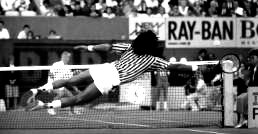 game fewer (7-6, 6-2, 6-2). In the completion of a match suspended by rain, Andre Agassi of the United States defeated Andres Vysand of the Soviet Union 7-5, 6-3, 6-2. Agassi next plays Magnus Gustafsson of Sweden in the fourth round. In other matches, Pat Cash defeated fellow Australian Mark Woodforde 4-6, 6-2, 6-1, 6-2; seventh-seeded Kent Carlsson beat Martin Jaite of Argentina 6-2, 6-3, 6-1; and Andrei Chesnokov of the Soviet Union, seeded 14th, downed Eduardo Bengochea of Argentina 6-1, 4-6, 6-4, 6-0. Yannick Noah, the men’s ninth seed from France, needed four sets to calm a worried full house on Center Court and overcome Jakob Hlasek of Switzerland 6-4, 6-4, 6-7(5), 6-3. “It’s a great feeling. When I play I feel that people like it when I win,” Noah said on the atmosphere during his matches in Paris. “Maybe it’s because my game is fun to watch. People feel my emotions, they feel closer to me.”
game fewer (7-6, 6-2, 6-2). In the completion of a match suspended by rain, Andre Agassi of the United States defeated Andres Vysand of the Soviet Union 7-5, 6-3, 6-2. Agassi next plays Magnus Gustafsson of Sweden in the fourth round. In other matches, Pat Cash defeated fellow Australian Mark Woodforde 4-6, 6-2, 6-1, 6-2; seventh-seeded Kent Carlsson beat Martin Jaite of Argentina 6-2, 6-3, 6-1; and Andrei Chesnokov of the Soviet Union, seeded 14th, downed Eduardo Bengochea of Argentina 6-1, 4-6, 6-4, 6-0. Yannick Noah, the men’s ninth seed from France, needed four sets to calm a worried full house on Center Court and overcome Jakob Hlasek of Switzerland 6-4, 6-4, 6-7(5), 6-3. “It’s a great feeling. When I play I feel that people like it when I win,” Noah said on the atmosphere during his matches in Paris. “Maybe it’s because my game is fun to watch. People feel my emotions, they feel closer to me.”
Fourth round: Jim Sarni
The game of tennis is played not only between the lines, but on the lines as well. And Ivan Lendl, playing picture-perfect tennis at the French Open, used every inch of fair territory today to defeat John McEnroe, 6-7(3), 7-6(3), 6-4, 6-4, in their fourth-round match (the matches was stretched over two days due to darkness, suspended at 4:2* in the 3rd set for Lendl, who he led 4-love in that set). The 29-year-old McEnroe was 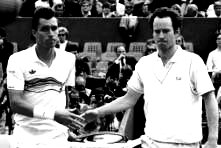 seeded 16th here, which he found ridiculous, because of a computer rating that heavily weights a player’s latest matches. He played very well, and his serve was tremendous, but Lendl was stronger, more consistent and placed his shots more precisely. The crucial game of the final set proved to be the 5th, when Lendl was able to break McEnroe’s serve. He took a point on a lob that McEnroe could only swat at. He took another point by lofting a lob to the baseline after McEnroe had served and volleyed twice without being able to put the point away on the soft clay. The final point was a perfect forehand return of service that whooshed right by McEnroe. Lendl served out the final game of the fourth set at love with the last shot a forehand that, fittingly, kissed the baseline. In a kind of ritual during the match, McEnroe would insist that a linesman inspect the mark in the red dirt left by Lendl’s ball. The chair umpire would direct the linesman to look. The linesman would bend to the line, touch the white tape and motion that Lendl’s ball had been good. ”You get into the groove,” said Lendl. ‘‘You hit deep, you hit some lines. You don’t really aim for the lines. I don’t know how to explain it. It just happens.” The crowd in Roland Garros Stadium was behind McEnroe all the way and stood to cheer him when he left the court at the end, and then booed Lendl. Although argumentative, McEnroe has ceased being obscene and has become more and more popular here. ”It’s like wine,” McEnroe observed. ”The older you get, the more they appreciate you, and the French do know a lot about wine.” Other American man did better, 18-year-old Andre Agassi advanced to the final eight on a 6-4, 6-2, 4-6, 6-0 victory over Magnus Gustafsson of Sweden. He became the youngest U.S. man to make a Grand Slam quarterfinal in the 20-year-old Open era. Agassi, with three clay-court tournament victories this season, lost his first set of the tournament but overcame the unseeded Gustafsson in a match interrupted twice – once by rain, the other time when the cannon-fire shots of the two young players snapped the let-cord. The ninth-seeded American dominated the match with his booming forehand. Up 1:0 in the 4th set when the rain hit, he came back after the delay to win five games in a row. Other 18-year-old player, Guillermo Perez-Roldan [17] of Argentina, upset second-seeded Stefan Edberg 7-5, 6-3, 6-3. Edberg’s loss to the Argentine was not as much of an upset as the rankings might make it seem. Perez-Roldan is a prototypical clay-court baseliner; Edberg, a serve-and-volley player, is chronically weak on clay. Of his 16 career singles titles, Edberg has had only one on clay. Perez-
seeded 16th here, which he found ridiculous, because of a computer rating that heavily weights a player’s latest matches. He played very well, and his serve was tremendous, but Lendl was stronger, more consistent and placed his shots more precisely. The crucial game of the final set proved to be the 5th, when Lendl was able to break McEnroe’s serve. He took a point on a lob that McEnroe could only swat at. He took another point by lofting a lob to the baseline after McEnroe had served and volleyed twice without being able to put the point away on the soft clay. The final point was a perfect forehand return of service that whooshed right by McEnroe. Lendl served out the final game of the fourth set at love with the last shot a forehand that, fittingly, kissed the baseline. In a kind of ritual during the match, McEnroe would insist that a linesman inspect the mark in the red dirt left by Lendl’s ball. The chair umpire would direct the linesman to look. The linesman would bend to the line, touch the white tape and motion that Lendl’s ball had been good. ”You get into the groove,” said Lendl. ‘‘You hit deep, you hit some lines. You don’t really aim for the lines. I don’t know how to explain it. It just happens.” The crowd in Roland Garros Stadium was behind McEnroe all the way and stood to cheer him when he left the court at the end, and then booed Lendl. Although argumentative, McEnroe has ceased being obscene and has become more and more popular here. ”It’s like wine,” McEnroe observed. ”The older you get, the more they appreciate you, and the French do know a lot about wine.” Other American man did better, 18-year-old Andre Agassi advanced to the final eight on a 6-4, 6-2, 4-6, 6-0 victory over Magnus Gustafsson of Sweden. He became the youngest U.S. man to make a Grand Slam quarterfinal in the 20-year-old Open era. Agassi, with three clay-court tournament victories this season, lost his first set of the tournament but overcame the unseeded Gustafsson in a match interrupted twice – once by rain, the other time when the cannon-fire shots of the two young players snapped the let-cord. The ninth-seeded American dominated the match with his booming forehand. Up 1:0 in the 4th set when the rain hit, he came back after the delay to win five games in a row. Other 18-year-old player, Guillermo Perez-Roldan [17] of Argentina, upset second-seeded Stefan Edberg 7-5, 6-3, 6-3. Edberg’s loss to the Argentine was not as much of an upset as the rankings might make it seem. Perez-Roldan is a prototypical clay-court baseliner; Edberg, a serve-and-volley player, is chronically weak on clay. Of his 16 career singles titles, Edberg has had only one on clay. Perez-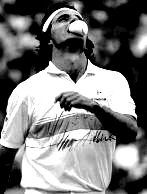 Roldan, on the other hand, has never won a match off of clay courts in his three years on the tour. Other Swedes advanced to the quarterfinals – two-time French Open winner Mats Wilander, the men’s third seed, ousted Ronald Agenor of Haiti 6-1, 7-6(4), 6-3, and unseeded Jonas Svensson upset his Swedish countryman Kent Carlsson, the No. 7 seed, 5-7, 7-6(8), 1-6, 6-4, 6-2. For Svensson, the only unseeded quarter-finalist, it was a second 5-set battle won over a compatriot (one round earlier he ousted Joakim Nystrom, also coming back from 1-2 in sets to win 6-2 in the fifth). Emilio Sanchez, the men’s 12th seed celebrating his 23rd birthday, eliminated Parisian favorite Yannick Noah, seeded sixth, 4-6, 6-3, 6-7(5), 6-2, 6-2. The two players, both agile and powerful with varied games, were perfectly matched and slugged it out in the main stadium before a partisan French crowd of 16,500. In the close exchanges in the front court, however, the dogged Sanchez had more success and he proved steadier from the back court as well. After a rain delay at the start of the 4th set, Sanchez came back from the locker room even stronger. ”When I went to the locker room I realized I could win the match,” Sanchez said. ”On the court I was not so convinced. I kept looking at him and thinking, ‘this is Noah. We are playing in Paris, in France’. It’s difficult. I was very nervous at the end.” Andrei Chesnokov of the Soviet Union, moved through to second major quarterfinal in 1988, upsetting No. 4 seed Pat Cash of Australia 2-6, 6-2, 6-4, 6-3 in a rain-delayed fourth-round match. Cash won the first set easily, but made more and more errors as the match wore on, as the patient Chesnokov kept returning Cash’s shots from the baseline. In the 4th set, Cash was serving at 3:3, 40/0, when he made five straight errors to lose the game. Chesnokov rapidly ran off two more games to win the match. It was a day of rain and sunshine at the French Open Monday. Henri Leconte, the last Frenchman left at Roland Garros, beat Boris Becker in five sets to keep the home crowd happy if a little wet. One day after former French Open champion Noah lost to Emilio Sanchez, Leconte raised the flag with his soggy and relentless conquest of the two-time Wimbledon champion. The match began at noon, was interrupted by rain three times, and finally concluded at 7:31 p.m., when Becker knocked a forehand return wide to give Leconte a 6-7(5), 6-3, 6-1, 5-7, 6-4 victory. John McEnroe buttoned up in his trench-coat, stood in the runway and watched the twilight drama on Center Court. He couldn’t leave this thriller, either. He watched Becker, diving after volleys on the red clay, break Leconte to win the fourth set and even the match. Then, he watched Leconte take a 2:0 lead in the 5th set and Becker take the next two games. But Becker ran out of comebacks after Leconte broke him for a 4:3 lead. There were a few tense moments when Leconte, serving for the match, fell behind love-30 and then double-faulted on his first match point, but the Frenchman held his nerve. ”I could not do much more than I did,” Becker said. ”I thought I had a chance to win, but Henri served well over five sets and he played a couple of ‘Leconte shots’. He’s playing almost the best tennis of his life.” Becker was 5-1
Roldan, on the other hand, has never won a match off of clay courts in his three years on the tour. Other Swedes advanced to the quarterfinals – two-time French Open winner Mats Wilander, the men’s third seed, ousted Ronald Agenor of Haiti 6-1, 7-6(4), 6-3, and unseeded Jonas Svensson upset his Swedish countryman Kent Carlsson, the No. 7 seed, 5-7, 7-6(8), 1-6, 6-4, 6-2. For Svensson, the only unseeded quarter-finalist, it was a second 5-set battle won over a compatriot (one round earlier he ousted Joakim Nystrom, also coming back from 1-2 in sets to win 6-2 in the fifth). Emilio Sanchez, the men’s 12th seed celebrating his 23rd birthday, eliminated Parisian favorite Yannick Noah, seeded sixth, 4-6, 6-3, 6-7(5), 6-2, 6-2. The two players, both agile and powerful with varied games, were perfectly matched and slugged it out in the main stadium before a partisan French crowd of 16,500. In the close exchanges in the front court, however, the dogged Sanchez had more success and he proved steadier from the back court as well. After a rain delay at the start of the 4th set, Sanchez came back from the locker room even stronger. ”When I went to the locker room I realized I could win the match,” Sanchez said. ”On the court I was not so convinced. I kept looking at him and thinking, ‘this is Noah. We are playing in Paris, in France’. It’s difficult. I was very nervous at the end.” Andrei Chesnokov of the Soviet Union, moved through to second major quarterfinal in 1988, upsetting No. 4 seed Pat Cash of Australia 2-6, 6-2, 6-4, 6-3 in a rain-delayed fourth-round match. Cash won the first set easily, but made more and more errors as the match wore on, as the patient Chesnokov kept returning Cash’s shots from the baseline. In the 4th set, Cash was serving at 3:3, 40/0, when he made five straight errors to lose the game. Chesnokov rapidly ran off two more games to win the match. It was a day of rain and sunshine at the French Open Monday. Henri Leconte, the last Frenchman left at Roland Garros, beat Boris Becker in five sets to keep the home crowd happy if a little wet. One day after former French Open champion Noah lost to Emilio Sanchez, Leconte raised the flag with his soggy and relentless conquest of the two-time Wimbledon champion. The match began at noon, was interrupted by rain three times, and finally concluded at 7:31 p.m., when Becker knocked a forehand return wide to give Leconte a 6-7(5), 6-3, 6-1, 5-7, 6-4 victory. John McEnroe buttoned up in his trench-coat, stood in the runway and watched the twilight drama on Center Court. He couldn’t leave this thriller, either. He watched Becker, diving after volleys on the red clay, break Leconte to win the fourth set and even the match. Then, he watched Leconte take a 2:0 lead in the 5th set and Becker take the next two games. But Becker ran out of comebacks after Leconte broke him for a 4:3 lead. There were a few tense moments when Leconte, serving for the match, fell behind love-30 and then double-faulted on his first match point, but the Frenchman held his nerve. ”I could not do much more than I did,” Becker said. ”I thought I had a chance to win, but Henri served well over five sets and he played a couple of ‘Leconte shots’. He’s playing almost the best tennis of his life.” Becker was 5-1  against Leconte before Monday, but the one loss was on clay in Hamburg earlier this month. Becker can beat Leconte on grass (twice at Wimbledon) and on carpet, but the slow stuff is quicksand. ”Boris still has things to learn about playing on clay,” Leconte said. ”He doesn’t always play the right shot. And I sensed he was very nervous.” Leconte didn’t get tense when the weight of the country fell on him after Noah lost. Leconte has won three five-setters in four matches and is 5-0 lifetime in five-set matches at Roland Garros. ”There’s more pressure, being the only Frenchman,” said Leconte, who reached the quarterfinals in 1985 and the semifinals in 1986, but fell in the first round to Ricki Osterthun last year. ”I didn’t expect Noah to lose to Sanchez. I just tried to take my time.” Leconte took all day, with the rain and the wind and the delays, ”It’s like this at Grand Slam tournaments. The same thing happen at Wimbledon. It rains and you can’t play any more. ‘When it rained, I got a massage, I read the newspapers and I thought about something else.”
against Leconte before Monday, but the one loss was on clay in Hamburg earlier this month. Becker can beat Leconte on grass (twice at Wimbledon) and on carpet, but the slow stuff is quicksand. ”Boris still has things to learn about playing on clay,” Leconte said. ”He doesn’t always play the right shot. And I sensed he was very nervous.” Leconte didn’t get tense when the weight of the country fell on him after Noah lost. Leconte has won three five-setters in four matches and is 5-0 lifetime in five-set matches at Roland Garros. ”There’s more pressure, being the only Frenchman,” said Leconte, who reached the quarterfinals in 1985 and the semifinals in 1986, but fell in the first round to Ricki Osterthun last year. ”I didn’t expect Noah to lose to Sanchez. I just tried to take my time.” Leconte took all day, with the rain and the wind and the delays, ”It’s like this at Grand Slam tournaments. The same thing happen at Wimbledon. It rains and you can’t play any more. ‘When it rained, I got a massage, I read the newspapers and I thought about something else.”
Quarterfinals: (AP)
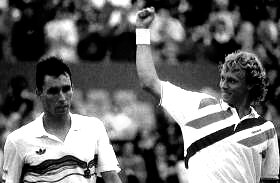 Top-ranked Ivan Lendl, looking drained by his two-day victory over John McEnroe, today was upset in the French Open quarterfinals by unseeded Jonas Svensson of Sweden [21], who varied his backcourt game with well-timed volleys at the net in ousting the defending champion 7-6(5), 7-5, 6-2 in 2 hours, 40 minutes. Lendl never showed the powerful form he used to overcome McEnroe in a fourth-round match played Tuesday night and yesterday with interruptions for rain and darkness. He also had a trainer come onto the court twice, apparently to treat a muscle problem in his right shoulder, and appeared bothered by a noisy union demonstration just outside the stadium grounds. Svensson, 21, said he was not aware of Lendl’s shoulder problem and was glad he didn’t know. “If you know the other guy is hurt, maybe you lose a little bit your concentration,” the Swede said. Lendl’s concentration appeared shaken by the bullhorns and recorded music wafting into Center Court from a demonstration by workers from an airplane-manufacturing plant. “Do something about it,” Lendl said to chair umpire Jacques Dorfmann while serving to win the 1st set at 5:4. Dorfmann shrugged his shoulders – the demonstrators were massed outside the Roland Garros stadium grounds – and Lendl lost his serve and eventually the set. Lendl led the first-set tie-break 5:2*, but then dropped five consecutive points, the final two on backhand volleys by Svensson, who is better known for his groundstrokes. Lendl lost the 2nd set when Svensson broke his serve in the 11th game with three straight drop shots – a backhand volley, a backhand half-volley, then another backhand volley. In the 3rd set, the demonstrators left, but Lendl seemed to be having more and more trouble with his shoulder, making many uncharacteristic unforced errors. Lendl, who missed the semifinals in a Grand Slam tournament for the first time since Wimbledon in 1985, ended the match by hitting a backhand into the net on match point. “He was playing unorthodox tennis on clay,” Lendl said. “I would have said he was lucky, but he had been doing that in his two previous matches.” The loss was Lendl’s first at the French Open since the 1985 final. It halted his 18-match winning streak in Paris, and 15-match winning streak on clay in 1988 (had won Monte Carlo & Rome prior to Roland Garros ’88). “My game plan was to confuse him and play slow balls and make him feel he is safe back there,” Svensson said. “Then go for it fast and come it. He didn’t know what was going on… which shots I was coming in on.” Lendl said of Svensson: “I thought he played extremely well. He was taking the ball early and playing very unorthodox tennis. He was hitting very strange shots.” Svensson will look to keep it up Friday against France’s Henri Leconte. The No. 11 seed reached the semifinals for the second time in three years by beating Soviet Union’s Andrei Chesnokov 6-3, 6-2, 7-6(4). Leconte, the last representative of France in the tournament, said Lendl’s defeat will mean many of his countrymen will think his chances of winning the title are much better. “That puts a little more pressure on me,” he said, “People expect me to go a long way.” Hours later, the French
Top-ranked Ivan Lendl, looking drained by his two-day victory over John McEnroe, today was upset in the French Open quarterfinals by unseeded Jonas Svensson of Sweden [21], who varied his backcourt game with well-timed volleys at the net in ousting the defending champion 7-6(5), 7-5, 6-2 in 2 hours, 40 minutes. Lendl never showed the powerful form he used to overcome McEnroe in a fourth-round match played Tuesday night and yesterday with interruptions for rain and darkness. He also had a trainer come onto the court twice, apparently to treat a muscle problem in his right shoulder, and appeared bothered by a noisy union demonstration just outside the stadium grounds. Svensson, 21, said he was not aware of Lendl’s shoulder problem and was glad he didn’t know. “If you know the other guy is hurt, maybe you lose a little bit your concentration,” the Swede said. Lendl’s concentration appeared shaken by the bullhorns and recorded music wafting into Center Court from a demonstration by workers from an airplane-manufacturing plant. “Do something about it,” Lendl said to chair umpire Jacques Dorfmann while serving to win the 1st set at 5:4. Dorfmann shrugged his shoulders – the demonstrators were massed outside the Roland Garros stadium grounds – and Lendl lost his serve and eventually the set. Lendl led the first-set tie-break 5:2*, but then dropped five consecutive points, the final two on backhand volleys by Svensson, who is better known for his groundstrokes. Lendl lost the 2nd set when Svensson broke his serve in the 11th game with three straight drop shots – a backhand volley, a backhand half-volley, then another backhand volley. In the 3rd set, the demonstrators left, but Lendl seemed to be having more and more trouble with his shoulder, making many uncharacteristic unforced errors. Lendl, who missed the semifinals in a Grand Slam tournament for the first time since Wimbledon in 1985, ended the match by hitting a backhand into the net on match point. “He was playing unorthodox tennis on clay,” Lendl said. “I would have said he was lucky, but he had been doing that in his two previous matches.” The loss was Lendl’s first at the French Open since the 1985 final. It halted his 18-match winning streak in Paris, and 15-match winning streak on clay in 1988 (had won Monte Carlo & Rome prior to Roland Garros ’88). “My game plan was to confuse him and play slow balls and make him feel he is safe back there,” Svensson said. “Then go for it fast and come it. He didn’t know what was going on… which shots I was coming in on.” Lendl said of Svensson: “I thought he played extremely well. He was taking the ball early and playing very unorthodox tennis. He was hitting very strange shots.” Svensson will look to keep it up Friday against France’s Henri Leconte. The No. 11 seed reached the semifinals for the second time in three years by beating Soviet Union’s Andrei Chesnokov 6-3, 6-2, 7-6(4). Leconte, the last representative of France in the tournament, said Lendl’s defeat will mean many of his countrymen will think his chances of winning the title are much better. “That puts a little more pressure on me,” he said, “People expect me to go a long way.” Hours later, the French 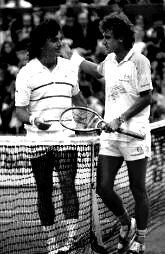 fans wildly applauded Andre Agassi, the 18-year-old wonder from Las Vegas, as he topped his peer Guillermo Perez-Roldan 6-2, 6-2, 6-4 to gain the semifinals. The kid with the fierce forehand and denim shorts is the next American with a chance to end the 33-year U.S. drought since Tony Trabert won the French Open in 1955. In Friday’s semifinals, Agassi plays third-seeded, two-time former champion Mats Wilander, who fought off Spain’s Emilio Sanchez 6-7(5), 7-6(2), 6-3, 6-4 in 4 hours. Wilander came back astonishingly thrice from a brink, twice with a happy-ending: he was *1:5 down in the 1st set, saved three set points in the 2nd set trailing *2:5, he also rallied from a *2:4 deficit of the 4th set winning the crucial 7th game after four ‘deuces’. The French also drank up the bubbly effervescence of Agassi, who blew a kiss to the crowd after he routed Perez-Roldan in a preview of next month’s Davis Cup match. ”It comes in handy when the crowd wants you to win,” said Agassi, the youngest American semifinalist in a Grand Slam since McEnroe was 18 at Wimbledon in 1977… ”I want to win, but I want to entertain the crowd as well.”
fans wildly applauded Andre Agassi, the 18-year-old wonder from Las Vegas, as he topped his peer Guillermo Perez-Roldan 6-2, 6-2, 6-4 to gain the semifinals. The kid with the fierce forehand and denim shorts is the next American with a chance to end the 33-year U.S. drought since Tony Trabert won the French Open in 1955. In Friday’s semifinals, Agassi plays third-seeded, two-time former champion Mats Wilander, who fought off Spain’s Emilio Sanchez 6-7(5), 7-6(2), 6-3, 6-4 in 4 hours. Wilander came back astonishingly thrice from a brink, twice with a happy-ending: he was *1:5 down in the 1st set, saved three set points in the 2nd set trailing *2:5, he also rallied from a *2:4 deficit of the 4th set winning the crucial 7th game after four ‘deuces’. The French also drank up the bubbly effervescence of Agassi, who blew a kiss to the crowd after he routed Perez-Roldan in a preview of next month’s Davis Cup match. ”It comes in handy when the crowd wants you to win,” said Agassi, the youngest American semifinalist in a Grand Slam since McEnroe was 18 at Wimbledon in 1977… ”I want to win, but I want to entertain the crowd as well.”
Semifinals: (AP)
Third-seeded Mats Wilander, mixing elegant lobs with precise passing shots, outlasted American Andre Agassi 4-6, 6-2, 7-5, 5-7, 6-0 today in the French Open semifinal (the Swede had a break point for a 4:0 lead in the 1st set, and was two points away from winning in four). Wilander, the only survivor from the top 10 seeds after a week of upsets, has won the championship here twice and 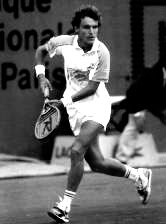 will be playing in the final for the fifth time in seven years. Agassi, an energetic 18-year-old from Las Vegas, went all out, grunting explosively with the effort of pounding his ground strokes but found Wilander covering every inch of the clay court to send them back. Once, after several remarkable returns in a row ended with a point for Wilander, Agassi aimed the handle of his racket at his opponent and pulled the trigger, as if a rifle shot were the only kind the agile Swede could not handle. “He surprised me a lot. I didn’t think he’d be this good,” Wilander said. “I’ve never played against a player who hits the ball so hard on his forehand.” The Swede also said he wasn’t bothered by Agassi’s antics, or the delighted response from the crowd. “He’s a real sportsman on the court. It’d be great if he can keep that attitude,” Wilander said. But Agassi also made frequent unforced errors, and usually punctuated them with a loud yip of dismay. At a couple of his worst moments, he tossed his racket hopelessly in the air. In the final set, Agassi looked beaten and too tired to chase down Wilander ‘s shots. Trailing 0:3, 15/40, he lost track of the score, thinking he had already lost his serve, and waited for Wilander to serve when it was still the American’s turn. Agassi may be arriving just in time to fill the void at the top of American tennis ranks. U.S. tennis has been in the decline for the past few years. No American man has won a grand slam title since John McEnroe‘s 1984 U.S. Open triumph. McEnroe, 29, is attempting his second comeback in three years, with indifferent results. Jimmy Connors is 35 and has been sidelined with an injured foot. Both are controversial, furthermore, for their on-court behavior. Others, like Jimmy Arias and Aaron Krickstein, have come before Agassi, quickly picking up the label “the next great American player,” but have disappeared into the black hole of tennis mediocrity. “It is unbelievably important that he doesn’t go the way of other young players like Arias and Krickstein,” Wilander said. “It is important for tennis that he makes it, for sure.” Henri Leconte, seeded 11th, thrilled the home crowd with his flair in a quick 7-6(3), 6-2, 6-3 victory over unseeded Jonas Svensson of Sweden. Leconte took a 4:2* lead in the 1st set before Svensson, a serve-and-volley Swede who eliminated defending champion Ivan Lendl in the quarterfinals, charged in front, 5:4. They served out the set and Leconte took easily the tiebreaker. Leconte was on top
will be playing in the final for the fifth time in seven years. Agassi, an energetic 18-year-old from Las Vegas, went all out, grunting explosively with the effort of pounding his ground strokes but found Wilander covering every inch of the clay court to send them back. Once, after several remarkable returns in a row ended with a point for Wilander, Agassi aimed the handle of his racket at his opponent and pulled the trigger, as if a rifle shot were the only kind the agile Swede could not handle. “He surprised me a lot. I didn’t think he’d be this good,” Wilander said. “I’ve never played against a player who hits the ball so hard on his forehand.” The Swede also said he wasn’t bothered by Agassi’s antics, or the delighted response from the crowd. “He’s a real sportsman on the court. It’d be great if he can keep that attitude,” Wilander said. But Agassi also made frequent unforced errors, and usually punctuated them with a loud yip of dismay. At a couple of his worst moments, he tossed his racket hopelessly in the air. In the final set, Agassi looked beaten and too tired to chase down Wilander ‘s shots. Trailing 0:3, 15/40, he lost track of the score, thinking he had already lost his serve, and waited for Wilander to serve when it was still the American’s turn. Agassi may be arriving just in time to fill the void at the top of American tennis ranks. U.S. tennis has been in the decline for the past few years. No American man has won a grand slam title since John McEnroe‘s 1984 U.S. Open triumph. McEnroe, 29, is attempting his second comeback in three years, with indifferent results. Jimmy Connors is 35 and has been sidelined with an injured foot. Both are controversial, furthermore, for their on-court behavior. Others, like Jimmy Arias and Aaron Krickstein, have come before Agassi, quickly picking up the label “the next great American player,” but have disappeared into the black hole of tennis mediocrity. “It is unbelievably important that he doesn’t go the way of other young players like Arias and Krickstein,” Wilander said. “It is important for tennis that he makes it, for sure.” Henri Leconte, seeded 11th, thrilled the home crowd with his flair in a quick 7-6(3), 6-2, 6-3 victory over unseeded Jonas Svensson of Sweden. Leconte took a 4:2* lead in the 1st set before Svensson, a serve-and-volley Swede who eliminated defending champion Ivan Lendl in the quarterfinals, charged in front, 5:4. They served out the set and Leconte took easily the tiebreaker. Leconte was on top 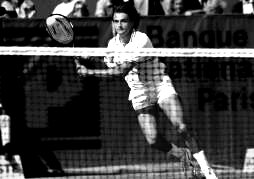 from there. He broke in the second, sixth and eight games of the 2nd set and came back from 3:1* down in the 3rd to gain his first Grand Slam. “He closes his eyes and goes for everything,” said Svensson in admiration of Leconte. “He makes a lot of unbelievable shots. I didn’t get to play my game.” Leconte is the first Frenchman to reach the final in Roland Garros Stadium since Yannick Noah won the event in 1983. Wilander, who won the Australian Open in January, will be going for his second Grand Slam title of the year. He holds an 8-2 lead in career meetings with Leconte and has not lost since May 1985. “I feel great. I have nothing to lose, so I’m going to play the best I can,” said Leconte. The hopes of a nation will be riding on Leconte’s racket. For many a French sports fan – and some who are not – the French sports year begins and ends with the tournament at Roland Garros. Leconte thinks there will be a lot of support for him when he meets Wilander. “I know I’ll have the public behind me and I hope they’ll be there for the match against Mats ,” Leconte said. “It has happened since I beat Becker.”
from there. He broke in the second, sixth and eight games of the 2nd set and came back from 3:1* down in the 3rd to gain his first Grand Slam. “He closes his eyes and goes for everything,” said Svensson in admiration of Leconte. “He makes a lot of unbelievable shots. I didn’t get to play my game.” Leconte is the first Frenchman to reach the final in Roland Garros Stadium since Yannick Noah won the event in 1983. Wilander, who won the Australian Open in January, will be going for his second Grand Slam title of the year. He holds an 8-2 lead in career meetings with Leconte and has not lost since May 1985. “I feel great. I have nothing to lose, so I’m going to play the best I can,” said Leconte. The hopes of a nation will be riding on Leconte’s racket. For many a French sports fan – and some who are not – the French sports year begins and ends with the tournament at Roland Garros. Leconte thinks there will be a lot of support for him when he meets Wilander. “I know I’ll have the public behind me and I hope they’ll be there for the match against Mats ,” Leconte said. “It has happened since I beat Becker.”
Final: Richard Finn
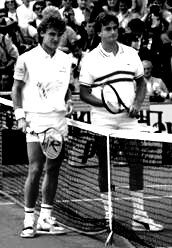 Mats Wilander‘s “impossible dream” of winning the Grand Slam is very much a living reality. Sunday Wilander added the French Open crown to his Australian Open title to win the first two legs of this year’s Grand Slam by routing favorite son Henri Leconte 7-5, 6-2, 6-1 before a disappointed partisan Roland Garros crowd. “My next step is to win either Wimbledon or the U.S. Open, winning both might be too optimistic” said Wilander after the 1 hour and 52 minute rout, the shortest final since 1980 (six minutes shorter then). To complete the Grand Slam, a player must win the Australian, French, Wimbledon and U.S. Opens in one calendar year. Only four players have ever accomplished the feat: among men Don Budge of the United States in 1937 and Rod Laver of Australia in 1962 and among women Maureen Connolly of the United States in 1953, and 1969 and Margaret Smith Court of Australia, in 1970. Wimbledon’s grass courts are up next – June 20. In his career the Swede has quietly won three French Opens and three Australian Opens, but never the U.S. Open or Wimbledon. “With all the big servers like McEnroe and Becker I think it will be tough for him,” said Leconte. Wilander’s finest Wimbledons were the quarterfinals last year and the fourth round in 1986. “Winning there is a completely different story. I know there will be a little more pressure,” said Wilander, who will move up into the No. 2 spot behind Ivan Lendl when the weekly Association of Tennis Professionals computer rankings are released Monday. Strangely, Wilander’s first two Australian Open crowns in 1983 and ’84 came on grass. “It is still the same game at Wimbledon, serve and volley and come in on everything,” said Wilander, who won this January on the new Rebound Ace court. “There is no real reason why I shouldn’t be able to do well at Wimbledon.” So high was his standard against Leconte, that duplicating that at Wimbledon might be a pipe dream. Wilander played flawlessly. He made 71 of 73 first serves! “I didn’t make any unforced errors,” said Wilander. “I didn’t play fancy.” When Leconte got to net, he was repeatedly passed by pinpoint passing shots. Especially sharp was Wilander ‘s crosscourt backhand shot. The crowd let Leconte, only the fifth Frenchman in the final since 1946, know how badly he was
Mats Wilander‘s “impossible dream” of winning the Grand Slam is very much a living reality. Sunday Wilander added the French Open crown to his Australian Open title to win the first two legs of this year’s Grand Slam by routing favorite son Henri Leconte 7-5, 6-2, 6-1 before a disappointed partisan Roland Garros crowd. “My next step is to win either Wimbledon or the U.S. Open, winning both might be too optimistic” said Wilander after the 1 hour and 52 minute rout, the shortest final since 1980 (six minutes shorter then). To complete the Grand Slam, a player must win the Australian, French, Wimbledon and U.S. Opens in one calendar year. Only four players have ever accomplished the feat: among men Don Budge of the United States in 1937 and Rod Laver of Australia in 1962 and among women Maureen Connolly of the United States in 1953, and 1969 and Margaret Smith Court of Australia, in 1970. Wimbledon’s grass courts are up next – June 20. In his career the Swede has quietly won three French Opens and three Australian Opens, but never the U.S. Open or Wimbledon. “With all the big servers like McEnroe and Becker I think it will be tough for him,” said Leconte. Wilander’s finest Wimbledons were the quarterfinals last year and the fourth round in 1986. “Winning there is a completely different story. I know there will be a little more pressure,” said Wilander, who will move up into the No. 2 spot behind Ivan Lendl when the weekly Association of Tennis Professionals computer rankings are released Monday. Strangely, Wilander’s first two Australian Open crowns in 1983 and ’84 came on grass. “It is still the same game at Wimbledon, serve and volley and come in on everything,” said Wilander, who won this January on the new Rebound Ace court. “There is no real reason why I shouldn’t be able to do well at Wimbledon.” So high was his standard against Leconte, that duplicating that at Wimbledon might be a pipe dream. Wilander played flawlessly. He made 71 of 73 first serves! “I didn’t make any unforced errors,” said Wilander. “I didn’t play fancy.” When Leconte got to net, he was repeatedly passed by pinpoint passing shots. Especially sharp was Wilander ‘s crosscourt backhand shot. The crowd let Leconte, only the fifth Frenchman in the final since 1946, know how badly he was 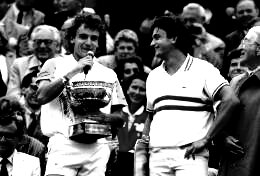 outplayed with jeers and even some boos at the end of the match. “I expected the crowd to be more with him,” said Wilander. “I don’t know whether they lost interest, but they weren’t there when he needed them.” Said Leconte, “To look at the match it looks like a bad match. I was making all the mistakes.” It was a competitive match in the 1st set. Leconte led 3:1, then served for the set at 5:4 after winning two games with dropping just one point. But a double fault put Leconte down 15/40 and two points later he lost the game. “The first set was very important, if he had won that he might have got the crowd on his side,” said the Swede. Wilander’s Wimbledon preparation will be low key. He will not play any tournaments, except for an exhibition event in Dublin next week. But he is looking to begin Wimbledon with soaring confidence. “I feel the most confident I’ve ever felt in going into Wimbledon,” said Wilander. If he needs to look for further encouragement in accomplishing the French and Wimbledon double he need only to look at 1978-80 when his famous countryman Bjorn Borg was winning on both sides of the English Channel. “When Borg was playing we said it would be tough and he was winning all the time,” recalled Leconte. And that was no dream. Wilander’s 29th title (7th major). Stats of the final.
outplayed with jeers and even some boos at the end of the match. “I expected the crowd to be more with him,” said Wilander. “I don’t know whether they lost interest, but they weren’t there when he needed them.” Said Leconte, “To look at the match it looks like a bad match. I was making all the mistakes.” It was a competitive match in the 1st set. Leconte led 3:1, then served for the set at 5:4 after winning two games with dropping just one point. But a double fault put Leconte down 15/40 and two points later he lost the game. “The first set was very important, if he had won that he might have got the crowd on his side,” said the Swede. Wilander’s Wimbledon preparation will be low key. He will not play any tournaments, except for an exhibition event in Dublin next week. But he is looking to begin Wimbledon with soaring confidence. “I feel the most confident I’ve ever felt in going into Wimbledon,” said Wilander. If he needs to look for further encouragement in accomplishing the French and Wimbledon double he need only to look at 1978-80 when his famous countryman Bjorn Borg was winning on both sides of the English Channel. “When Borg was playing we said it would be tough and he was winning all the time,” recalled Leconte. And that was no dream. Wilander’s 29th title (7th major). Stats of the final.
****************************

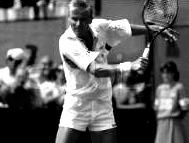
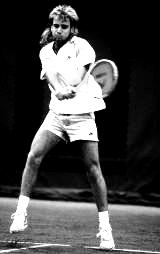
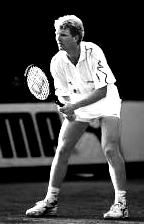

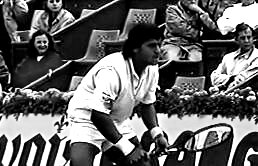
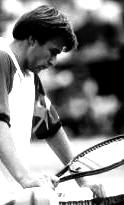
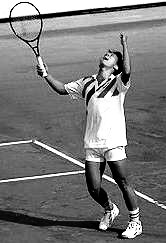
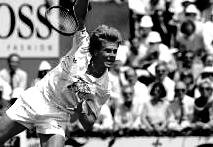
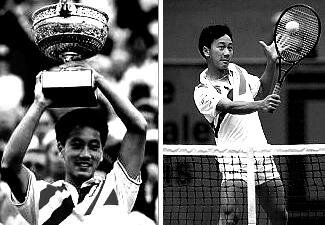
Matches on YT:
1988
McEnroe vs. Chang
Lendl vs. McErnoe (2nd set TB)
Leconte vs. Becker (short clip)
Wilander vs. Agenor
Wilander vs. Agassi
Leconte vs. Svensson (short clip)
Wilander vs. Leconte (short clip)
1989
short clips:
Santoro vs. Palmer (juniors)
Tulasne vs. Skoff
Italian:
Edberg vs. Mancini
German:
Chang vs. Lendl
Edberg vs. Becker
English:
Chesnokov vs. Wilander
Chang vs. Agenor
Chang vs. Edberg